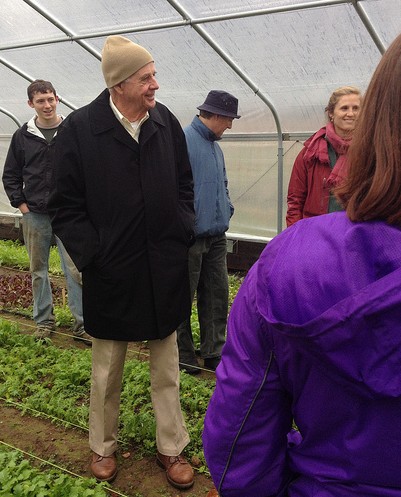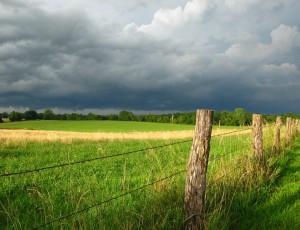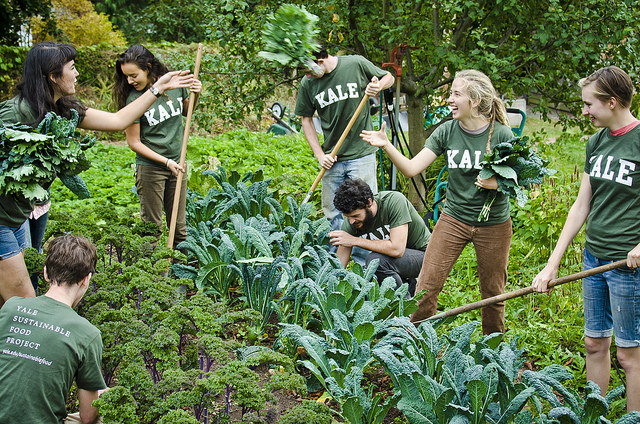On a cold, wet morning in early December, a group of students and staff from the Yale Sustainable Farm Project huddled closely together under the farm’s pavilion. Finally, a minivan pulled up and Wendell Berry slowly emerged. He wore a long, black overcoat and a stocking hat that read “The Aldo Leopold Foundation.” The gentle, if slightly mischievous, sparkle in his eyes belied his seventy-nine years. He smiled genuinely during introductions, and spoke with a casual, almost nostalgic, Southern drawl that pulls you in and invites you to listen more attentively.
Wendell Berry has been an iconic figure of American arts and letters for nearly half a century. He has penned (he famously and quite defiantly doesn’t own or use a computer) dozens of novels, short stories, and essays, and is perhaps best known for his poetry. Berry talks like a poet, with precision and a thoughtfulness for the beauty of language rarely heard these days.

He was coming to Yale to accept the Chubb Fellowship, an honor bestowed by Timothy Dwight College, one of Yale’s twelve residential colleges. In accepting the Fellowship, Berry joined a long and esteemed list that includes the likes of writer Chinua Achebe, musician Wynton Marsalis, paleoanthropologist Richard Leakey, Nobel Peace Prize Laureate Aung San Suu Kyi, and President George H. W. Bush. In addition to a public talk to a packed house at New Haven’s Shubert Theater, there would be formal dinners, a private wine and cheese (and appropriately for the native Kentuckian, bourbon) reception. But for one of America’s greatest agrarian philosophers, writers, and activists, the highlight would be a tour and luncheon at the Yale Sustainable Farm Project.
Berry’s writing has attracted international acclaim and garnered him numerous awards. He is a Fellow of the American Academy of Arts and Sciences, and a recipient of the Richard C. Holbrook Distinguished Achievement Award. In 2010, Berry received the National Humanities Medal, and in 2012 he gave the Jefferson Lecture, the highest honor bestowed by the federal government for distinguished intellectual achievement in the humanities.
And yet, listening to him talk with Yale students in the winter rain, I was struck by his humility. As a fellow Midwesterner, he reminded me of my grandfather, and so many others I know from back home—simple, unassuming, hard-working, committed farmers. In many respects, our initial conversation felt like reacquainting with an old friend.
After brief introductions, students and staff led Berry on a tour of the Yale farm. More like a large garden by Midwestern standards, the one-acre farm is celebrating it’s tenth anniversary. Students showed Berry the winter rye and vetch cover crops, and described how their fertilizer, made from kelp harvested from the Long Island Sound, closes the loop between land-based agriculture and the ocean ecosystem. They introduced Berry to the farm’s brood of layer hens, and a brief conversation about the eco-politics of animal production ensued. Berry boasted that his granddaughters can “gut two birds a minute,” and asked what is done with the birds. A student explained that the farm does not butcher their birds, but instead donates them to Common Ground, a local environmental science charter school. “Political vegetarians make me a little uneasy,” Berry says. “There’s a threshold for cruelty that we all live above.”
Although he has never been a full-time farmer, Berry credits his rural upbringing as essential to his illustrious career. He smiles wistfully as he describes hanging around tobacco barns as a kid, listening to “wonderful talk by people who really know how to talk.” In addition to writing and editing, he taught English at the University of Kentucky for nearly twenty years. In 1964, Berry and his wife, Tanya, moved their family to Port Royal, Kentucky and purchased 125 acres they call Lane’s Landing where they raise grains, vegetables, and livestock. This simple but radical commitment to place has come to not only define his writing, but also serves as an embodied expression of his philosophy, activism, and land ethic. Berry believes that our social and physical hyper-mobility is antithetical to cultivating sustainable communities. As Berry says, “We’re using the word “wild” wrong. There are no wild animals. They’re not wild; they’re domestic—going about their business, making their homes. They think we’re wild. We’re not doing a good job of making our homes, raising our children. We’re just being wild!”
For Berry, commitment doesn’t simply require discipline and sacrifice; it demands unremitting attention. He draws from what he calls his lifelong “studentship” of literature and agriculture. “You have to study the text as it is presented, whether it’s a page or a field,” Berry says. “You don’t graduate from it. Wes Jackson talks about eyes to acres; someone has to be watching all the time.”
Our rural landscape has changed radically since Berry published The Unsettling of America: Culture and Agriculture in 1977. Considered by many to be his magnum opus, the book is both a cautionary tale of the social and ecological consequences of a nation divorced from its land, and also an impassioned call for a more rooted citizenry.
How have we responded to Barry’s agrarian call to arms? Who, if anyone, is watching the land?
A report released earlier this year by the U.S. Department of Agriculture’s Economic Research Service paints a complex picture of agrarian America. It shows significant growth in the number of small farms, owing largely to the popularity of CSAs, chic farm-to-table restaurants, and other locavore trends. In fact, the mean size of a farm these days is only forty-five acres, and two-thirds of all U.S. farms are one hundred acres or less. However, these farms together comprise a small fraction of total cropland.
By contrast, the largest farms, those greater than two thousand acres, account for only 2.2% of America’s farms but control over 34% of our country’s total cropland. According to the report, the greatest decline in terms of both the number of farms and the amount of cropland is in middle-sized farms between one hundred and five hundred acres, like Lane’s Landing. And diversified farms, like Berry’s, have given way to more specialized operations, particularly for meat and dairy production.
Even seemingly simple questions such as “What is a farm?” are not so straightforward. For example, the U.S. Census Bureau considers a farm to be any operation that generates $1,000 or more in annual agricultural sales. Surveys with farmers in my home state of Iowa, however, suggest that agriculture is not the primary source of income for up to a third of all so-called “farms.”
The exponential growth and influence, both practical and political, of multi-national agribusinesses has further complicated our connections with the land. An exploded view of the globalized food system would reveal an extensive professional assortment including geneticists, chemists, advertisers, extension agents, insurance agents, economists, crop dusters, commodity traders, lawyers, truck drivers, elevator operators, implement dealers, migrant laborers, and farmers. These days, a so-called “conventional” farmer needs to understand as much about futures trading and information technology as agronomy or animal husbandry. In such a complex system, it’s hard to find time to watch the land.
It is no secret that agribusiness giant Monsanto dominates commodity agriculture. In the United States alone, Monsanto controls over 90% of the soybean production and over 80% of both corn and cotton production. For fiscal year 2013, Monsanto’s net sales crested over $14.8 billion, and its net income grew a staggering 21% from the previous year. In October, Monsanto paid $1.1 billion cash for a little-known entity called The Climate Corporation, an agricultural insurance company founded by former Google employees David Friedberg and Siraj Khaliq, that uses big data and climatology to predict risk. With a technology platform that monitors weather measurements from 2.5 million locations to generate daily climate forecasts, Americans can be confident that Monsanto is watching the land.

By contrast, The U.S. Department of Agriculture’s Economic Research Service says that sales of organic products account for an estimated 4% of total food sales. The vast majority of these sales occur in conventional grocery and natural food stores, although direct-to-consumer sales have steadily climbed over the past twenty years. In 1994, the year that the U.S.D.A. began tracking them, there were less than two thousand farmers’ markets in the U.S.; by 2013, that number had quadrupled to over eight thousand. Fruits and vegetables account for the bulk of organic sales, for which consumers may pay a high premium. In California, which accounts for over one-third of the nation’s total organic production, weeding by hand can cost farmers more than twenty times per acre what it costs conventional farmers to spray chemical herbicides. Many producers hire undocumented field hands in an effort to cut costs.
Several years ago, I spent a season working on a diversified organic farm in Massachusetts. At the time, I was the only American citizen who worked in the fields. It was, quite literally, backbreaking labor, and I was constantly amazed by how my Mexican co-workers could pick a quarter-mile row of kale or lettuce without standing up to stretch and rest. They were funny, energetic, dependable, and observant. On farms nationwide, these unprotected workers are watching the land.
The recent growth in the number of college farms, sustainable agriculture programs, and food-related courses, including those found in traditionally liberal arts schools, represents a strong movement toward the resettling of America. There is no single model for a college farm. Many provide food for student dining halls or local food pantries, while others encourage students to engage in sustainability research. Sustainable agriculture programs are changing the demographics of the American farmer. Nearly 25% of farmers now possess a bachelor’s degree, up from the 4% who held degrees when Barry purchased Lane’s Landing.
In 2000, concerned students in an environmental health and policy class taught by Professor John Wargo at the Yale School of Forestry and Environmental Studies formed the organization Food from the Earth to promote conversations about food and sustainability at Yale. When the influential Bay Area restaurateur Alice Waters’ daughter Fanny Singer came to Yale in 2001, Waters met with then President Richard Levin about the quality of food being served in the dining halls and the disparity between the university’s classrooms and kitchens. That conversation, and Food from the Earth became the genesis of the Yale Sustainable Farm Project.
A decade later, English majors harvest kale alongside architecture students at the farm, which offers undergraduate summer internships, and has hosted sustainable food conferences. Students also develop a better understanding of larger food systems by selling produce at a local farmers’ market. The project has also expanded to Yale’s new campus—the West Campus Urban Farm integrates community and academics, including students from the nearby Yale School of Nursing. Although Yale is not an ag school per se, it now offers over twenty courses on food and agriculture each semester.

In addition, the project is reaching out to the greater New Haven community through its annual Seed to Salad program. For five weeks in the spring, second graders come to the farm to learn how to grow food. Their visits begin with a dance, incorporating “fun” into the curriculum. “Working together is a little like dancing together,” Berry observes.
Back under the farm’s pavilion, the conversation turns philosophical as students discuss the current state of culture and agriculture in America.
One student asks Berry about the power of corporations. “It seems like with all that’s going on,” she says, “we can’t beat it.”
“You might be right,” Berry replies. “It is discouraging, and I have been discouraged. I’ve been fighting the coal companies for nearly 30 years and we’re soundly licked. So what do you do? Well, you don’t stop.”
Berry senses the students’ anxiety and restlessness. “What you’re really getting at is the problem of hope,” he says. “Well, in the first place, hope is a virtue so you have to have it. If you know examples of something better, you know it’s possible, and however far off a possibility it may be is a part of hope. And I think it’s really important to have a good time. You’ve got to laugh; you can’t take yourself too seriously. You mustn’t base your hope on the idea of winning. I don’t have time for people who say there’s no hope so just go have a good time.”
Berry pauses and adds, “I always flinch when I hear a young person say ‘I’m going to get into this and in five years we’re gonna win it.’ I certainly won’t be here to see us “win” it, you may not be either.”
Later, during his address at the Shubert Theater, Berry revisits the theme of hope. “Hope is a different thing from optimism,” he says. “Optimism and pessimism are based on the idea of how things are gonna turn out. Hope is grounded in the present; it’s not about the future. It’s about the reality of possibilities, this sense of possibility that you can do better. Friends, others give me hope. Hope lives on hope.”